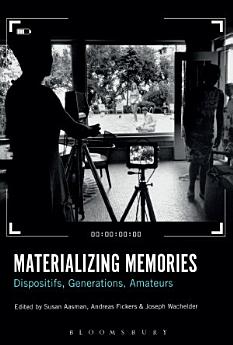Materializing Memories: Dispositifs, Generations, Amateurs
Susan Aasman · Andreas Fickers · Joseph Wachelder
ágú. 2018 · Bloomsbury Publishing USA
Rafbók
288
Síður
reportEinkunnir og umsagnir eru ekki staðfestar Nánar
Um þessa rafbók
A multitude of devices and technological tools now exist to make, share, and store memories and moments with family, friends, and even strangers. Memory practices such as home movies, which originated as the privilege of a few, well-to-do families, have now emerged as ubiquitous and immediate cultures of sharing. Departing from the history of home movies, this volume offers a sophisticated understanding of technologically mediated, mostly ritualized memory practices, from early beginnings in the fin-de-siècle to today.
Departing from a longue durée perspective on home movie practices, Materializing Memories moves beyond a strict historical study to grapple with highly theorized fields, such as media studies, memory studies, and science and technology studies (STS). The contributors to this volume reflect on these different intellectual backgrounds and perspectives, but all chapters share a common framework by addressing practices of use, user configurations, and relevant media landscapes. Grasping the cultural dynamics of such multi-faceted practices requires a multidimensional conceptual approach, here achieved by centering around three concepts as central analytical lenses: dispositifs, generations, and amateurs.
Departing from a longue durée perspective on home movie practices, Materializing Memories moves beyond a strict historical study to grapple with highly theorized fields, such as media studies, memory studies, and science and technology studies (STS). The contributors to this volume reflect on these different intellectual backgrounds and perspectives, but all chapters share a common framework by addressing practices of use, user configurations, and relevant media landscapes. Grasping the cultural dynamics of such multi-faceted practices requires a multidimensional conceptual approach, here achieved by centering around three concepts as central analytical lenses: dispositifs, generations, and amateurs.
Um höfundinn
Susan Aasman is Associate Professor of History at the University of Groningen, the Netherlands. As a media historian and active researcher, she has written extensively about the history of amateur media and the history of documentary filmmaking. Since 2012, she has served as the chief editor for the Dutch Journal for Media History.
Andreas Fickers is Professor of Contemporary and Digital History at Luxembourg University, Luxembourg. His research ranges from transnational media history to the European history of technology and theory of digital history. He is the co-editor in chief of the open access online journal VIEW - European Journal of Television History and Culture and the author, most recently, of Communicating Europe: Technologies, Information, Events (Palgrave, 2016).
Joseph Wachelder is Associate Professor of History at Maastricht University, the Netherlands. His research focuses on interactions between science and culture, and his wide-ranging publication history has addressed issues in higher education, the popularization of science, colour and sense experience in art and science, and educational toys and games. He has previously held positions in Gewina (the Dutch Society for the History of Medicine, Mathematics, Science and Technology) and the European Society for the History of Science (ESHS).
Andreas Fickers is Professor of Contemporary and Digital History at Luxembourg University, Luxembourg. His research ranges from transnational media history to the European history of technology and theory of digital history. He is the co-editor in chief of the open access online journal VIEW - European Journal of Television History and Culture and the author, most recently, of Communicating Europe: Technologies, Information, Events (Palgrave, 2016).
Joseph Wachelder is Associate Professor of History at Maastricht University, the Netherlands. His research focuses on interactions between science and culture, and his wide-ranging publication history has addressed issues in higher education, the popularization of science, colour and sense experience in art and science, and educational toys and games. He has previously held positions in Gewina (the Dutch Society for the History of Medicine, Mathematics, Science and Technology) and the European Society for the History of Science (ESHS).
Gefa þessari rafbók einkunn.
Segðu okkur hvað þér finnst.
Upplýsingar um lestur
Snjallsímar og spjaldtölvur
Settu upp forritið Google Play Books fyrir Android og iPad/iPhone. Það samstillist sjálfkrafa við reikninginn þinn og gerir þér kleift að lesa með eða án nettengingar hvar sem þú ert.
Fartölvur og tölvur
Hægt er að hlusta á hljóðbækur sem keyptar eru í Google Play í vafranum í tölvunni.
Lesbretti og önnur tæki
Til að lesa af lesbrettum eins og Kobo-lesbrettum þarftu að hlaða niður skrá og flytja hana yfir í tækið þitt. Fylgdu nákvæmum leiðbeiningum hjálparmiðstöðvar til að flytja skrár yfir í studd lesbretti.






